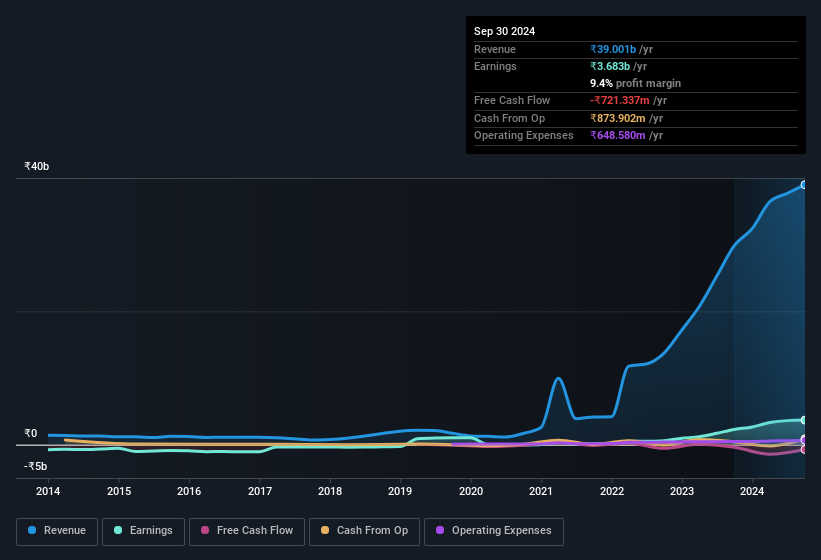Jupiter Wagons' (NSE:JWL) Solid Profits Have Weak Fundamentals
Investors were disappointed with Jupiter Wagons Limited's (NSE:JWL) earnings, despite the strong profit numbers. We did some digging and found some worrying underlying problems.
See our latest analysis for Jupiter Wagons

Zooming In On Jupiter Wagons' Earnings
One key financial ratio used to measure how well a company converts its profit to free cash flow (FCF) is the accrual ratio. In plain english, this ratio subtracts FCF from net profit, and divides that number by the company's average operating assets over that period. The ratio shows us how much a company's profit exceeds its FCF.
That means a negative accrual ratio is a good thing, because it shows that the company is bringing in more free cash flow than its profit would suggest. That is not intended to imply we should worry about a positive accrual ratio, but it's worth noting where the accrual ratio is rather high. To quote a 2014 paper by Lewellen and Resutek, "firms with higher accruals tend to be less profitable in the future".
For the year to September 2024, Jupiter Wagons had an accrual ratio of 0.28. Therefore, we know that it's free cashflow was significantly lower than its statutory profit, which is hardly a good thing. Over the last year it actually had negative free cash flow of ₹721m, in contrast to the aforementioned profit of ₹3.68b. Coming off the back of negative free cash flow last year, we imagine some shareholders might wonder if its cash burn of ₹721m, this year, indicates high risk. Unfortunately for shareholders, the company has also been issuing new shares, diluting their share of future earnings.
That might leave you wondering what analysts are forecasting in terms of future profitability. Luckily, you can click here to see an interactive graph depicting future profitability, based on their estimates.
One essential aspect of assessing earnings quality is to look at how much a company is diluting shareholders. As it happens, Jupiter Wagons issued 6.3% more new shares over the last year. That means its earnings are split among a greater number of shares. To celebrate net income while ignoring dilution is like rejoicing because you have a single slice of a larger pizza, but ignoring the fact that the pizza is now cut into many more slices. You can see a chart of Jupiter Wagons' EPS by clicking here.
A Look At The Impact Of Jupiter Wagons' Dilution On Its Earnings Per Share (EPS)
As you can see above, Jupiter Wagons has been growing its net income over the last few years, with an annualized gain of 2,852% over three years. In comparison, earnings per share only gained 526% over the same period. And at a glance the 61% gain in profit over the last year impresses. But in comparison, EPS only increased by 49% over the same period. And so, you can see quite clearly that dilution is influencing shareholder earnings.
Changes in the share price do tend to reflect changes in earnings per share, in the long run. So Jupiter Wagons shareholders will want to see that EPS figure continue to increase. However, if its profit increases while its earnings per share stay flat (or even fall) then shareholders might not see much benefit. For that reason, you could say that EPS is more important that net income in the long run, assuming the goal is to assess whether a company's share price might grow.
Our Take On Jupiter Wagons' Profit Performance
As it turns out, Jupiter Wagons couldn't match its profit with cashflow and its dilution means that earnings per share growth is lagging net income growth. For the reasons mentioned above, we think that a perfunctory glance at Jupiter Wagons' statutory profits might make it look better than it really is on an underlying level. If you want to do dive deeper into Jupiter Wagons, you'd also look into what risks it is currently facing. For instance, we've identified 3 warning signs for Jupiter Wagons (1 can't be ignored) you should be familiar with.
In this article we've looked at a number of factors that can impair the utility of profit numbers, and we've come away cautious. But there are plenty of other ways to inform your opinion of a company. For example, many people consider a high return on equity as an indication of favorable business economics, while others like to 'follow the money' and search out stocks that insiders are buying. While it might take a little research on your behalf, you may find this free collection of companies boasting high return on equity, or this list of stocks with significant insider holdings to be useful.
New: Manage All Your Stock Portfolios in One Place
We've created the ultimate portfolio companion for stock investors, and it's free.
• Connect an unlimited number of Portfolios and see your total in one currency
• Be alerted to new Warning Signs or Risks via email or mobile
• Track the Fair Value of your stocks
Have feedback on this article? Concerned about the content? Get in touch with us directly. Alternatively, email editorial-team (at) simplywallst.com.
This article by Simply Wall St is general in nature. We provide commentary based on historical data and analyst forecasts only using an unbiased methodology and our articles are not intended to be financial advice. It does not constitute a recommendation to buy or sell any stock, and does not take account of your objectives, or your financial situation. We aim to bring you long-term focused analysis driven by fundamental data. Note that our analysis may not factor in the latest price-sensitive company announcements or qualitative material. Simply Wall St has no position in any stocks mentioned.
About NSEI:JWL
Jupiter Wagons
Manufactures and sells railway wagons, wagon components, and railway transportation equipment in India and internationally.
Flawless balance sheet with reasonable growth potential.
Similar Companies
Market Insights
Community Narratives



